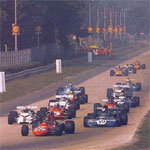
Oddly enough I was thinking of the slipstreamers this morning when I stuck the new Ballboy album in the kitchen stereo for the umpteeth time this week. I thought of Gethin speeding along in the wake of the likes of Jackie Stewart, biding his time. And I thought, you know, in terms of writing, in terms of ´music journalism', I feel kind of like Peter Gethin.
You see, I've never been in the forefront of anything. I've always been there but not there, kind of hanging off the back of the pack, picking up the scraps after the real explorers have already moved on. It's like I'm just lucky to know some great adventurers and that I maybe get the chance to come across their exquisitely drawn maps a few days before most everyone else does. As a result of this I feel like a phoney a lot of the time, but as Kevin Rowland might say, that's my problem and I'll deal with it.
But back to Ballboy. I had never heard of them before a copy of last year's epic A Guide To The Daylight Hours album dropped through my door, even though they had already released a stream of well received singles and EPs (collected on the Club Anthems 2001 album). I just hadn't been paying attention, and maybe that's my fault for not reading the music press or listening to the radio, but whatever. In many respects though I was excited about the fact that I was coming to the group late: like discovering Dylan or The Beach Boys in my mid thirties, it meant there were already a heap of records with great songs to discover. The difference was of course that with Ballboy there was still the magical ingredient of anticipation of what was still to come.
Everyone knows the line about anticipation being so much better by now of course. That I was anticipating a delight from a new Ballboy album then is an understatement of mammoth proportions. That it more than lived up to that anticipation should be a mark of how much urgency you should be investing in getting your hands on a copy.

Which means that The Sash... is a sparse affair; a pared back echo of the album that I was expecting, like hearing its ghost three times removed at the end of a crevasse of ice tongues. Shivering, silvery shapes appear in the air, escape to cornflower emptiness above.
The key really is the cover of Galaxie 500's beatific ´Tell Me' from their peerless On Fire masterpiece. Despite (or because of) eschewing the tremulous electric ache of the original, Ballboy nevertheless retain the essential otherworldliness of the moment; capture the same essence in their own manner; mould their souls into a spooky doppelganger that in terms of sheer power you could sit next to the original and never tell apart. They achieve the same kind of feeling in other moments of the album too, notably on the wonderful ´you should fall in love with me' (just try listening in the depths of winter and not feel an unbearable longing for the summer just passed), the poignant ´past lovers' and the icy ´dutch trance', the latter being the second cover version on the album. Originally recorded by now defunkt fellow SL recording artistes Khaya (and not Polish popster Kayah as originally assumed!), ´Dutch Trance' is a spectral vision that so gloriously captures the very magic of Pop. I mean, how can you not adore lines like ´the song that moves me most is on the radio / and it reminds me of things we never said / and I can't stop crying...' It all reminds me strangely of Sidmouth's The Visitors singing about hearing your favourite song play too loud from an open window, and although the sound of the two is so very different, that's not what matters. It seldom is. No, what matters is the feeling, and of course anyone who doesn't understand that doesn't understand the meaning of Pop.
All of which brings us to the last of the album's trio of covers: Bruce Springsteen's ´Born In The USA.' Now I'm going to admit here and now that I've struggled with Bruce for a long time. I knew something about the fact there were some great records out there, had heard murmurs of the greatness of Nebraska for example, but I was always sceptical. I just kept hearing that damn chorus line, kept seeing that flag, those faded jeans. ´Born in the USA'... ´Born in the USA'... it always sounded like such horrifically patriotic chest beating and I hated it with a passion.
So when I first listened to Ballboy's skew on the song I admit to doing more than a double take. I listened hard. I listened and I thought to myself, surely these aren't the original lyrics? Surely this song of betrayal, loss and rejection cannot be the same one that conjured notions of patriotism and jingoistic flag waving? Is this song that makes the notion of being born in the USA the worst curse imaginable really the same one that Bruce envisioned? Or is it all about context? Is it all about the fact that Ballboy refrain from injecting the chorus until the very end, thereby refusing to deflect attention from the verses, and does that then make Bruce's version greater or poorer in comparison? Listening again to Springsteen's version (I'd love to hear the acoustic version he apparently recorded at the time of Nebraska and which I understand is on the Tracks boxset of b-sides and rarities) I still cannot stomach the sound of the song, but it nevertheless hooks me; the odd collision between the meaning read into the words and the meaning read into the delivery of the words. Or the reading of the verse and chorus as two elements at odds with each other; battling a sense of patriotic duty with the knowledge that in reality that country has let you down so badly. Ballboy however sidestep those issues, and in the context of our times lay bare that curse of Americana, create a song that speaks of embarrassment, that whispers apology.
As a whole, however, The Sash... is far from an apology. Instead it's more of a quiet rebuttal of expectation; a refusal to play the obvious game. Not a retreat exactly, but more of a measured withdrawal. A walk into the twilight with a glint in the eye and a collar turned up against the cold, just like Dean walking away and bent to it again at the end of that novel you all know and love but that I bet like me you haven't read in an age.
Maybe it's time to delve again. Maybe it's time to rejuvenate obsessions; time to drop into the slipstream again.
© 2003Alistair Fitchett